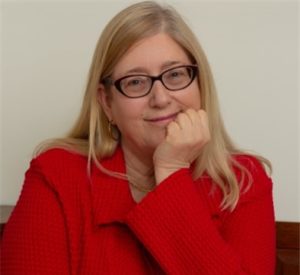
WMO: Why do you write?
JS: When I was a kid, I read an interview with Ray Bradbury where he said the books in the library were his family and he wanted to join them on the shelf. That resonated with me. Not to write and publish books seems inconceivable—although as life worked out, I didn’t publish my first book until my sixties. Up to that point, I only did technical writing: submissions to FDA for biotech companies seeking product approvals. Submissions are confidential—the very opposite of publication.
WMO: What themes and ideas do you like to explore?
JS: A lot of my work focuses on exploding myths about older women through telling vivid stories about our lives. I’m also keen on the child who calls BS in the story of the Emperor’s New Clothes; I’ve always wanted to be a muckraker, like Jessica Mitford. I may yet get to do that.
WMO: What have you already written and published?
JS: When Brilliant Charming Bastard publishes on October 29th I will have four books under my belt. The first, The Year of the Mite, is a scientific memoir about an infestation of parasitic mites. I published that one under the pen name Jane Ishka for the benefit of my family, who just wanted to forget the whole experience.
Since then my books have been under the Stella Fosse pen name, and focus on the sensual lives of women past midlife. Aphrodite’s Pen is a how-to-write book for older women, encouraging us to write erotica. The Erotic Pandemic Ball is a collection of fantasy tales about the love lives of women in a locked-down senior community in 2020. Brilliant Charming Bastard is my first novel. It’s about three women scientists who discover they are all dating a lying dilettante who is stealing their ideas for his invention. The women get together and decide getting rich is the best revenge. That was super fun to write.
WMO: What are you working on now?
JS: Publicity for the Bastard.
I admire Stephen King for always having three books underway: drafting one, editing a second, and doing publicity on a third. I hope to become that efficient; not there yet.
WMO: Whom do you picture as your audience when you write?
JS: I picture other women in their sixties. However, I really hope younger women read my work too, and that it gives them hope for a sexy future.
WMO: What do you find most challenging about writing, and why?
JS: Plot is the hardest story element for me. I wonder whether writing conflict is harder for women than men, given that we’ve been socialized to make nice. I am usually right-brain about writing except that I have to go full left brain to come up with a plot.
WMO: Whose work do you enjoy reading?
JS: One of the great things about writing is you get to meet other writers, and I made contact with Ruth O. Saxton while organizing the endorsements for the Bastard. I’m reading her marvelous collection, The Book of Old Ladies. I love her thoughts, her sensibility, her articulate style.
WMO: What is the best advice anyone ever gave you about writing?
JS: The very best advice I ever received is that writing is play. We should never give up play. Andy Couturier was my writing coach for my first book, and I recommend his book to everyone: Writing Open the Mind is fantastic.
WMO: What kind of feedback do you most appreciate?
JS: That really depends on the stage of the work. The first draft is just for the writer and is sublime play. The goal of feedback at that stage should only be: Here’s what I connected with in your work. Here’s what I loved. Keep writing!
During the developmental editing process, I appreciate ideas about avenues to explore.
During the later phase of editing, I appreciate hearing about the language in the writing and suggestions for clarifying it.
At the very end of editing, I just want to know where the quotation marks are missing.
